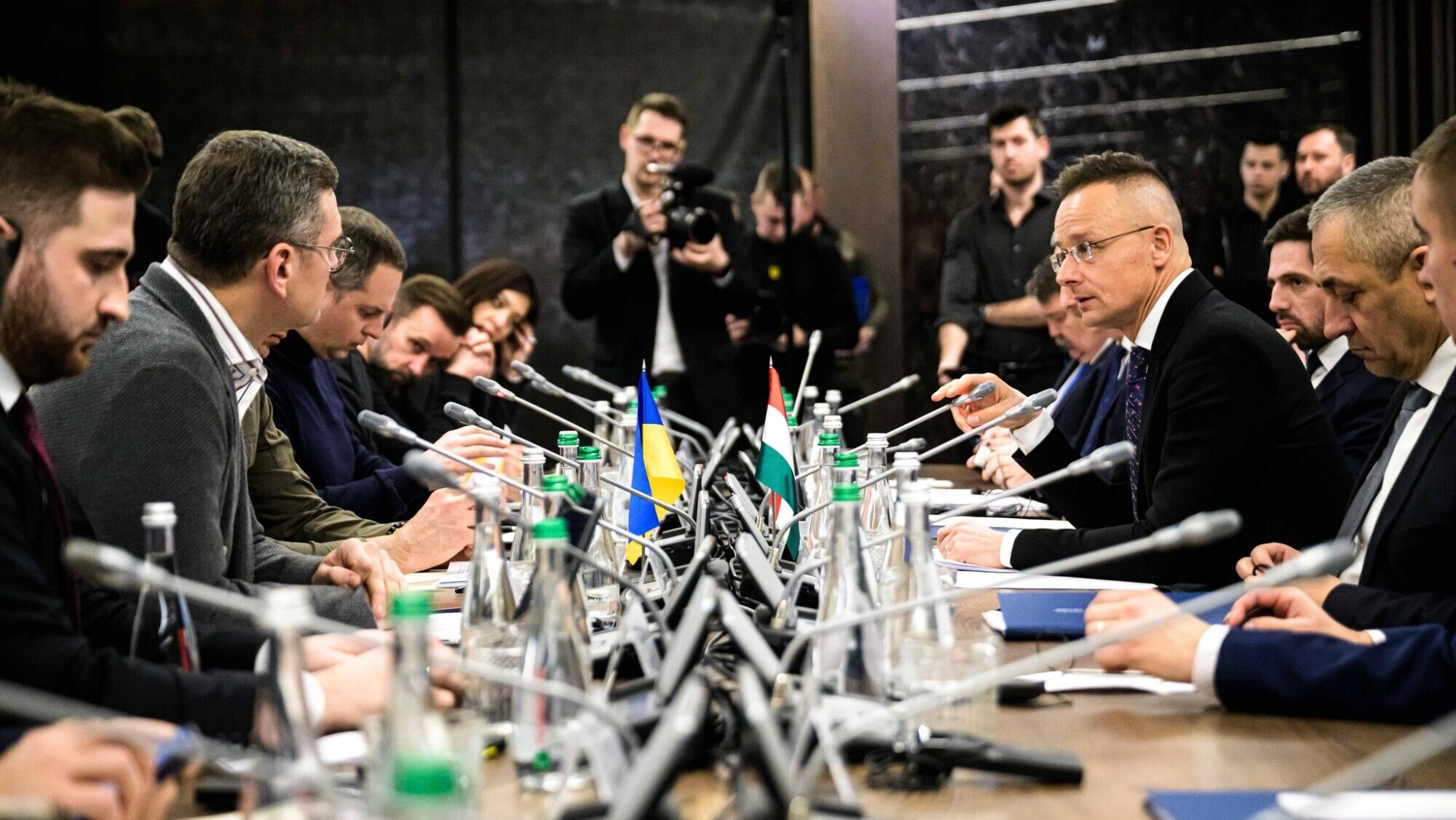
Ukrainian foreign minister Dmytro Kuleba (left center) and Hungarian foreign minister Péter Szijjártó (right center).
Photo: Péter Szijjártó / Facebook, 29 January, 2024
Hungarian Foreign Minister Péter Szijjártó traveled to Uzhhorod (Transcarpathia, Ukraine) on Monday, January 29th, to meet with his Ukrainian counterpart Dmytro Kuleba ahead of Thursday’s extraordinary EU Council summit, paving the way for an upcoming Orbán-Zelensky meeting as well. The two sides came to a preliminary agreement about restoring the Hungarian community’s language rights, which could be the first real step toward the normalization of relations.
Although Kyiv was eager to talk about the EU’s €50 billion aid package currently held up in the Council by Hungary, the foreign minister arrived with a different priority on the agenda.
Besides aiming to improve bilateral relations and kickstart a series of discussions on the highest levels, the primary objective of the Hungarian delegation was to secure the restoration of fundamental language rights for its diaspora living in the region after the Zelensky government had taken them away with the educational and language laws, finalized in 2017 and 2019, respectively.
“We would like to improve cooperation between Ukraine and Hungary,” Szijjártó said on social media before the trip, “and we will do our utmost to ensure that the Hungarian community in Transcarpathia regains its former rights.”
Although the crackdown on ethnic minorities’ language rights was primarily targeting Russians, many other ethnic communities living in Ukraine were caught in the crossfire, including Poles, Romanians, Bulgarians, Greeks, and Hungarians. For years, these five governments—along with the EU, the UN, and the CoE—maintained coordinated diplomatic pressure on Kyiv to repeal the controversial laws, which were ruled against by the Venice Commission as a violation of fundamental rights.
Naturally, the Russian invasion of Ukraine shifted priorities in the EU. Nonetheless, Hungary still maintains its position that any cooperation between Budapest and Kyiv depends on the restoration of previously existing rights—nothing more, nothing less.
This point was made clear by the foreign minister right at the start. “I would like to quickly state at the outset that the Hungarian government has never asked for any rights for the Hungarians in Transcarpathia that did not exist before 2015,” Szijjártó told Kuleba and the Ukrainian delegation.
During the press conference that followed, Szijjártó said the Hungarian delegation asked for the improvement of language rights in 11 points, including using the Hungarian language in schools, higher education, and cultural institutions.
After thanking Hungary for its humanitarian support and help with refugees, Kuleba confirmed that Kyiv was ready to cooperate and that they would set up a joint ‘operative workgroup’ that would be given ten days to come up with concrete legislative proposals that would be then reviewed by a separate intergovernmental committee. Both parties hope the solution will solve the near decade-old dispute as soon as possible and once and for all.
❗️FM Szijjártó in Transcarpathia: I would like to quickly state at the outset that the Hungarian government has never asked for any rights for the Hungarians in Transcarpathia that did not exist before 2015. I will now make requests here that, if met, would return us to the… pic.twitter.com/HeeQEvBDIf
— Zoltan Kovacs (@zoltanspox) January 29, 2024
Before the meeting, the foreign ministers—along with Andriy Yermak, the head of Zelensky’s office—stopped at the local cemetery and paid respects to the Transcarpathian soldiers who died in the war.
“We condemn the war and want peace as soon as possible. This morning I visited the cemetery in Uzhhorod, where I paid my respects to the victims. We must redouble our efforts, because saving lives is only possible through peace,” the Szijjártó said during the press conference.
“Hungary’s position is consistent: we stand by Ukraine’s sovereignty and territorial integrity,” the minister added.
Before the negotiations, Minister @DmytroKuleba, Head of the Office of the President @AndriyYermak & the Minister of Foreign Affairs and Trade of Hungary Péter Szijjártó paid tribute to 🇺🇦 soldiers who sacrificed their lives for the sovereignty & territorial integrity of Ukraine. pic.twitter.com/ExunJjjEfW
— MFA of Ukraine 🇺🇦 (@MFA_Ukraine) January 29, 2024
The other main purpose of the visit—and undoubtedly the most anticipated one—was to prepare a potential bilateral summit between PM Orbán and President Zelensky, which has been floated since December. According to Yermak, the summit is still on the table after Monday’s ministerial meeting, and it’s getting closer to becoming a reality.
“Both sides made it abundantly clear that they are interested in a high-level summit,” the President’s head of office said. “We made a very big step toward that happening, and I believe it could open a new chapter in our relationship.”
